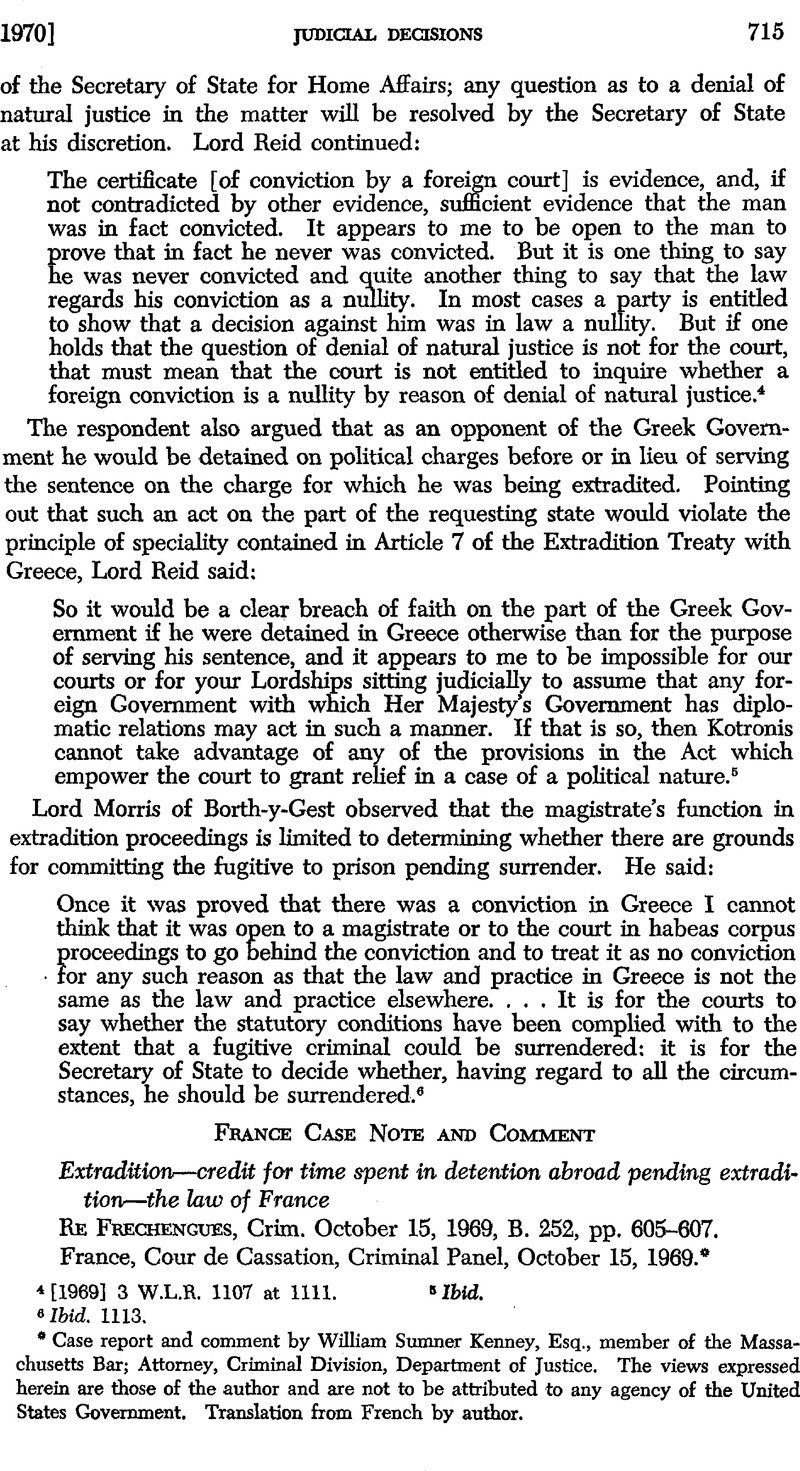No CrossRef data available.
Published online by Cambridge University Press: 28 March 2017

* Case report and comment by William Sumner Kenney, Esq., member of the Massachusetts Bar; Attorney, Criminal Division, Department of Justice. The views expressed herein are those of the author and are not to be attributed to any agency of the United States Government. Translation from French by author.
1 Juge destruction.
2 The highest judicial court in France which is sometimes referred to as the Supreme Court. The Criminal Panel (chambre criminelle) reviews criminal matters brought to the court. On judicial organization in France see P. Herzog, Civil Procedure in France 113-168 (1967); Kock, , “The Machinery of Law Administration in France,” 108 U. Pa. Law Rev. 366, 375 (1960)CrossRefGoogle Scholar; Pugh, , “Administration of Criminal Justice in France,” 23 La. Law Rev. 1, 7 (1962)Google Scholar.
3 Pourvoi en cassation.
4 Art. 23 of the Penal Code provides in pertinent part: “The duration of all punishments deprivative of liberty is calculated from the day on which the convict is detained pursuant to a final sentence.” Art. 24 of the Penal Code provides in pertinent part: “When there has been preventive detention, this detention will be totally deducted from the duration of the punishment imposed by the judgment or decision of conviction, unless the judge, by special order supported by reasons, rules that this deduction shall not be given or that only a portion of the period shall be credited against the sentence.“
5 Crim. October 15, 1969, B. 252, pp. 605-607; G.P. Dec. 10-12, 1969..
6 Mandat de dépôt or d'arrêt.
7 In Art. 23 the word “detained” is used, not “incarcerated.” Thus, a sentence commences on the day the individual is taken into custody and not on the day he is received at the penal institution. Merle et Vitu, Traité de Droit Criminel, No. 1356, p. 1262 (1967).
8 “Détention préventive,” that is, pre-conviction detention, which in the Anglo-Saxon system has until recently referred to internment for security and other such reasons. This concept in French is “internement de sûreté” Ancel, The Protection of Human Rights in Criminal Procedure Under French Law and the Kindred Systems 46 (1960). Recently in America the expression “preventive detention” has been used in the sense of pre-trial detention.
9 July 27, 1870, Cour d'Appel d'Orléans (S. 1870.2.325; D.1871.2.20) and Paris, June 28, 1883 (S.1883.2.177).
10 Merle et Vitu, cited note 7, p. 1264; II Bouzat et Pinatel, Traité de Droit Pénal et de Criminologie, No.1440, p.1105.
11 Merle et Vitu, cited note 7, No. 231, p. 230: Aymond, “Extradition,” Nos. 270-276, Répertoire de droit pénal et de procédure pénale (1968).
12 The representative of the Public Ministry at the Tribunal de Grande Instance is the Procureur de la République; at the Cour d'Appel, the Procureur Général. The duties of both officials are, in part, similar to those of a prosecuting attorney.
13 L'arrêt de mise en accusation. This resembles an indictment but must contain an exposition and legal qualification of the acts which are the object of the accusation. Art. 215, Code de Procédure Pénale.
14 The Chambre d'Accusation is a panel composed of a president who devotes full time to this assignment, and two “conseillers.” This panel is designated each year from among the “conseillers” of the Cour d'Appel. Judges of the Cour d'Appel are called “conseillers.” There is at least one Chambre d'Accusation within each Cour d'Appel. One of the functions of the Chambre is to act in a capacity somewhat similar to that of a grand jury. It has the sole authority to refer a “crime” to the Cour d'Assises for trial.
15 A “crime.“
16 The panel of the “Tribunal de Grande Instance” which hears penal matters is known as the “Tribunal Correctionnel.“
17 “ A “dé1it.“
18 The “Tribunal d'Instance” when it sits to try contraventions is known as “Tribunal de Police” and is presided over by a single judge.
19 A “contravention.“
20 Division d'Affaires Criminelles et de Grace.
21 Gazette du Palais, Dec. 10-12, 1969, pp. 3, 4.
22 An amendment to the laws or a new law proposed by the government as distinguished from a “proposition de loi” which is offered by a member of Parliament as an individual member.
23 The writings of legal scholars.
24 The case law.
25 Memorandum of Department of State, May, 1969; 63 A.J.I.L. 799 (1969).
26 Rubin, The Law of Criminal Correction 301-303 (1963).
27 18 U.S.C. § 3568: “The sentence of imprisonment of any person convicted of an offense shall commence to run from the date on which such person is received at the penitentiary, reformatory, or jail for service of such sentence. The Attorney General shall give any such person credit toward service of his sentence for any days spent in custody in connection with the offense or acts for which sentence was imposed…. “If any person shall be committed to jail or other place of detention to await transportation to the place at which his sentence is to be served, his sentence shall commence to run from the date on which he is received at such jail or other place of detention. “No sentence shall prescribe any other method of computing the term.“